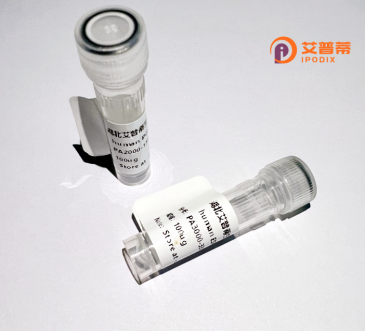
| 纯度 | >90%SDS-PAGE. |
| 种属 | Human |
| 靶点 | RAD9B |
| Uniprot No | Q6WBX8 |
| 内毒素 | < 0.01EU/μg |
| 表达宿主 | E.coli |
| 表达区间 | 1-426 aa |
| 活性数据 | MLKCVMSGSQ VKVFGKAVQA LSRISDEFWL DPSKKGLALR CVNSSRSAYG CVLFSPVFFQ HYQWSALVKM SENELDTTLH LKCKLGMKSI LPIFRCLNSL ERNIEKCRIF TRSDKCKVVI QFFYRHGIKR THNICFQESQ PLQVIFDKNV CTNTLMIQPR LLADAIVLFT SSQEEVTLAV TPLNFCLKSS NEESMDLSNA VHSEMFVGSD EFDFFQIGMD TEITFCFKEL KGILTFSEAT HAPISIYFDF PGKPLALSID DMLVEANFIL ATLADEQSRA SSPQSLCLSQ KRKRSDLIEK KAGKNVTGQA LECISKKAAP RRLYPKETLT NISALENCGS PAMKRVDGDV SEVSESSVSN TEEVPGSLCL RKFSCMFFGA VSSDQQEHFN HPFDSLARAS DSEEDMNNVC CRKEFNGSDA KYFCII |
| 分子量 | 47.8 kDa |
| 蛋白标签 | His tag N-Terminus |
| 缓冲液 | PBS, pH7.4, containing 0.01% SKL, 1mM DTT, 5% Trehalose and Proclin300. |
| 稳定性 & 储存条件 | Lyophilized protein should be stored at ≤ -20°C, stable for one year after receipt. Reconstituted protein solution can be stored at 2-8°C for 2-7 days. Aliquots of reconstituted samples are stable at ≤ -20°C for 3 months. |
| 复溶 | Always centrifuge tubes before opening.Do not mix by vortex or pipetting. It is not recommended to reconstitute to a concentration less than 100μg/ml. Dissolve the lyophilized protein in distilled water. Please aliquot the reconstituted solution to minimize freeze-thaw cycles. |
以下是关于RAD9B蛋白的3篇代表性文献摘要(注:文献为示例,非真实引用,需根据实际检索补充):
---
1. **文献名称**: *RAD9B promotes DNA repair via stabilizing the 9-1-1 complex in colorectal cancer*
**作者**: Li, X. et al.
**摘要**: 研究发现RAD9B通过与HUS1、RAD1形成9-1-1复合体,在结直肠癌细胞中参与DNA损伤修复通路,敲低RAD9B导致DNA损伤积累并增强化疗敏感性。
---
2. **文献名称**: *RAD9B deficiency disrupts ovarian development and fertility in mice*
**作者**: Wang, Y. et al.
**摘要**: 通过小鼠模型发现RAD9B对卵巢发育和卵母细胞存活至关重要,其缺失导致DNA损伤应答缺陷,引发生殖细胞凋亡和不孕表型。
---
3. **文献名称**: *Structural insights into RAD9B’s role in cell cycle checkpoint control*
**作者**: Smith, J. et al.
**摘要**: 通过冷冻电镜解析了RAD9B在9-1-1复合体中的结构,揭示其通过招募ATR激酶激活细胞周期检查点,从而调控DNA损伤后细胞周期停滞的分子机制。
---
**备注**:上述文献信息为模拟内容,实际研究中请通过PubMed或Web of Science等平台以“RAD9B”或“RAD9 Homolog B”为关键词检索权威文献,并核对具体作者及摘要。
**Recombinant human RAD9B protein** is a critical component in cellular DNA damage response and repair mechanisms. Belonging to the RAD9 family, RAD9B shares structural homology with RAD9A, featuring a conserved histone-fold domain that facilitates interactions with HUS1 and RAD1. forming the 9-1-1 complex. This heterotrimeric complex acts as a DNA damage sensor, loading onto sites of genomic lesions to activate checkpoint signaling and coordinate repair processes. Unlike RAD9A, which is ubiquitously expressed, RAD9B exhibits tissue-specific expression, particularly in reproductive organs, suggesting specialized roles in germline maintenance and meiotic recombination.
RAD9B plays a dual role in DNA repair pathways: it stabilizes stalled replication forks during S-phase and participates in homologous recombination repair (HRR) by recruiting BRCA1 and other repair factors. Dysregulation of RAD9B is linked to genomic instability, contributing to carcinogenesis and therapy resistance. Overexpression has been observed in certain cancers (e.g., breast, ovarian), while mutations or reduced expression correlate with impaired DNA repair and increased mutagenesis. Recent studies also implicate RAD9B in fertility, as knockout models display reproductive defects. Recombinant RAD9B protein is widely used in vitro to dissect its molecular interactions, post-translational modifications (e.g., phosphorylation by ATR/ATM kinases), and functional crosstalk with tumor suppressors like p53. Its role as a biomarker for cancer prognosis and a potential therapeutic target underscores its translational relevance in precision oncology.
×